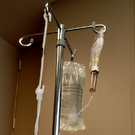Articles tagged with: Proteasome Inhibitors
NewsFlash »
Antidepressant Demonstrates Anti-Myeloma Activity - Results of a preclinical study conducted in China indicate that the antidepressant amitriptyline (Elavil) may have anti-myeloma activity. Amitriptyline is an older drug, first approved for use in the United States in the early 1960s. It belongs to a class of drugs known as tricyclic antidepressants. Myeloma patients may be aware of the drug because it sometimes is prescribed as a treatment for peripheral neuropathy (pain, tingling, and loss of sensation in the extremities due to nerve damage). In the recent Chinese study, researchers found that orally administered amitriptyline significantly reduced the growth of myeloma cells in mice implanted with either mouse or human myeloma cells. As a result, the drug substantially extended the survival of the mice with the myeloma cells. The researchers also found that combining amitriptyline with Velcade (bortezomib) had a greater anti-myeloma effect than would have been expected given the anti-myeloma effect of each individual drug on its own. For more information, please see the study in the journal Anti-Cancer Drugs (abstract).
Phase 3 Clinical Trial To Study Ixazomib Combination In Newly Diagnosed Multiple Myeloma Patients – The pharmaceutical company Millennium has launched a Phase 3 trial of its investigational drug ixazomib (MLN9708) in newly diagnosed multiple myeloma patients who are not candidates for stem cell transplantation. The study, which will be carried out in North America and Europe, will investigate the efficacy and safety of ixazomib in combination with Revlimid (lenalidomide) and dexamethasone (Decadron). Ixazomib is an oral drug that belongs to the same class of drugs as Velcade and Kyprolis (carfilzomib), called proteasome inhibitors. In recent Phase 1/2 clinical trials, ixazomib showed promise as a single agent as well as in combination with Revlimid and dexamethasone in both newly diagnosed and relapsed/refractory myeloma patients (see related Beacon news). For more information, please see the Millennium press release and the clinical trial description.
Human Cytomegalovirus Virus Reactivation After Donor Transplant Does Not Impact Survival In Myeloma Patients – The human cytomegalovirus virus (HCMV) is a type of herpes virus which infects over half the U.S. population. The virus is usually dormant, but if it is reactivated, it can result in eye or lung infections which, if they occur in patients who have received a donor stem cell transplant, can have serious consequences, including death. The results of a recent French study show that myeloma patients who carry HCMV are at high risk of virus reactivation after reduced-intensity donor stem cell transplantation, irrespective of whether the donor also carried the virus. Patients’ whose donors carried HCMV were also at risk of virus reactivation after transplantation. Another factor that contributed to virus reactivation was if the patient, within 100 days of their transplant, developed graft-versus-host disease (a potentially serious side effect of donor stem cell transplantation in which donor immune system cells attack the patient's cells). The French researchers also found, however, that virus reactivation did not negatively impact post-transplant outcomes, such as progression-free and overall survival. In fact, there was a trend toward better outcomes for patients who were at higher risk of virus reactivation. For more information, please see the study in the Mediterranean Journal of Hematology and Infectious Diseases (full text).
LLS Teleconference On Myeloma Treatment And Side Effect Management – On June 3, the Leukemia & Lymphoma Society (LLS) will sponsor a free teleconference call about the treatment of multiple myeloma and management of side effects. Dr. Vincent Rajkumar from the Mayo Clinic will lead the program, which runs from noon to 1:30 p.m. Eastern Time. Dr. Rajkumar will speak about current and emerging myeloma treatments, the role of clinical trials in the development of myeloma treatments, and the importance of communication between patient and provider about treatment-related side effects and management of them. For more information or to register, please see the LLS website.
News»

In a recent review article published in the journal Clinical Cancer Research, two myeloma experts from the Dana-Farber Cancer Institute, Dr. Nikhil Munshi and Dr. Kenneth Anderson, review the latest strategies in the treatment of multiple myeloma.
In their article, the experts discuss newer therapies that appear to be promising in clinical and preclinical studies.
According to the physicians, combination therapies that specifically target a patient’s genetic form of the disease will be required for long-term disease control and ultimately a cure.
Some Historical Perspective
In their review article, Drs. Munshi and …
News»

A subanalysis of recent clinical trial results shows good response rates for single-agent Kyprolis in heavily pretreated multiple myeloma patients with high-risk chromosomal abnormalities.
Specifically, the investigators found that the response rates for patients with high-risk chromosomal abnormalities were similar to those for patients without high-risk chromosomal abnormalities.
However, the researchers also found that response duration and overall survival remained significantly lower in patients with high-risk chromosomal abnormalities.
Nevertheless, the researchers describe the results as encouraging, and they suggest that treatment with Kyprolis (carfilzomib) may be beneficial for patients with high-risk …
News»

The American Society of Clinical Oncology will hold its 49th annual meeting May 31 through June 4 in Chicago.
Similar to previous years, more than 25,000 clinical specialists from all over the world are expected to attend the five-day meeting to discuss the current research in cancer treatment and care. The theme for this year’s meeting is “Building Bridges to Conquer Cancer.”
During the meeting, there will be presentations and seminars about all areas of cancer, including many focused specifically on multiple myeloma. The ASCO website currently lists more than 60 myeloma-based presentations (included …
News, Opinion»

Within the past nine months, two new agents have been approved for the treatment of relapsed multiple myeloma.
In July 2012, a second generation proteasome inhibitor, Kyprolis (carfilzomib), was approved for patients with relapsed/refractory disease. In February of this year, Pomalyst (pomalidomide) was approved for use in similar patients.
These two agents, with dexamethasone (Decadron) or in combination with other drugs, should further broaden the armamentarium for the treatment of myeloma as we continue to strive to make myeloma a chronic disease.
Rather than dwell on …
News»

A subgroup analysis of recent Phase 1/2 clinical trial results shows that Kyprolis in combination with Revlimid and low-dose dexamethasone is effective and well tolerated in newly diagnosed multiple myeloma patients over the age of 65.
All of the evaluated patients responded to treatment, with 83 percent of patients reaching at least a near complete response.
According to Dr. Andrzei Jakubowiak of the University of Chicago Medical Center, who presented the findings earlier this month at the International Myeloma Workshop (IMW) in Kyoto, Japan, the response rates compare favorably to the best …
News»

Initial results of an ongoing Phase 2 clinical trial show that Kyprolis in combination with Revlimid and low-dose dexamethasone may be effective and safe in high-risk smoldering multiple myeloma patients.
Specifically, the results show that all patients responded to the combination therapy, with 75 percent of patients achieving at least a near complete response.
Progression-free or overall survival results are not yet available, though, to indicate whether the combination therapy delays progression to myeloma or extends overall survival.
Dr. Ola Landgren from the U.S. National Cancer Institute and National Institutes of Health …
